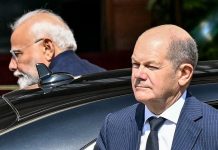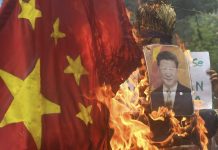A controversy has erupted over claims that Indian businessmen have flocked to Nepal to get Chinese-made Covid vaccines, which would make them eligible for travel to China. But Nepal’s Health Ministry has rejected such reports.
A BBC report claimed that hospital staff in Kathamandu were surprised to see people with Indian identity cards standing in queues to get vaccinated. Apparently, these people had entered hospitals with big suitcases and baggage indicating they were in a hurry to go somewhere.
A senior official of a Kathmandu-based hospital told BBC Nepali that when the hospital staff told the Indian citizens that they cannot administer them vaccines, the latter became angry and tried to pressure them.
The report comes in the wake of the announcement by the Chinese embassy in Kathmandu that it would provide visas only to those people who got inoculated through vaccines manufactured in China.
Dev Chandra Lal Karna, the spokesperson of Kathmandu’s Tribhuvan International Airport, was quoted by BBC as saying that many Indians now have the ‘No Objection Certificate’ required to travel to a third country from Nepal. This statement is corroborated by the files registered in the Indian Embassy in Kathmandu. There has also been a surge of Indians coming to Kathmandu.
However, according to the Indian news agency PTI, Nepal’s Health Ministry has dismissed media reports that some Indian businessmen have received Chinese vaccines against the coronavirus in Kathmandu to be eligible for travel to China.
The COVID-19 vaccination drive using 800,000 doses of China-donated vaccines started today. We'll definitely win the battle against the pandemic!?? pic.twitter.com/hbBYN0DwB6
— Ambassador Hou Yanqi (@PRCAmbNepal) April 7, 2021
Ganesh Shrivastav, information officer at the Ministry of Health and Population told PTI that they “have been regularly maintaining the record of those receiving vaccines against COVID-19, so there is no possibility of someone getting vaccinated without disclosing their identity.”
As Nepal is inoculating its population according to priority, it is unlikely that Indian businessmen have been provided vaccines.
India is facing a shortage of vaccines but it has not authorized any imports from China, probably due to the hostility between the two countries.
Last month, Kathmandu received 348,000 doses of made-in-India COVID-19 vaccines under the COVAX initiative.
COVID-19 Vaccines Global Access or COVAX, is a global initiative aimed at equitable access to COVID-19 vaccines led by Gavi, the Vaccine Alliance, the Coalition for Epidemic Preparedness Innovations, and the World Health Organization.
New Delhi had promised 1.92 million vaccines to the tiny Himalayan nation under COVAX. But after India’s production was hit, Nepal turned to China which donated 800,000 of its Sinopharm vaccine to the country.
China’s Interest In Nepal
As reported by The Eurasian Times, while India has steered clear of Nepal’s internal matters, the Chinese government has increased its influence due to its stakes in the Himalayan nation. China wants to have a say in the affairs of the Nepal Communist Party, which has been hit by an internal feud.
On December 20, Prime Minister KP Oli had dissolved the parliament, accusing members of his Nepal Communist Party (NCP) of being uncooperative, and called for mid-term polls.
Nepal’s Supreme Court, however, overturned Oli’s decision and restored the House. But the political turmoil is far from over with reports suggesting the opposition Nepali Congress has initiated moves to topple the Oli government and form an alternative government.
Follow EurAsian Times on Google News




